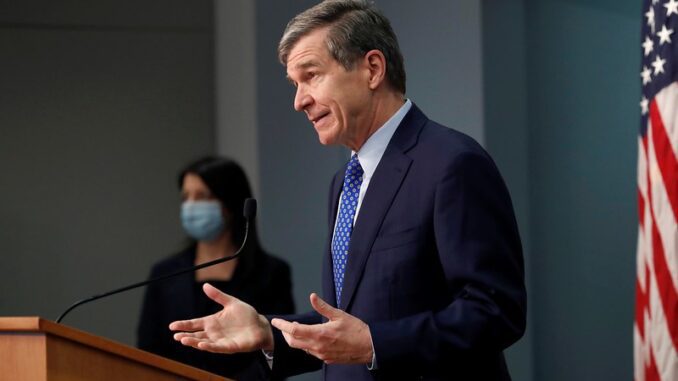
RALEIGH — Gov. Roy Cooper officially lifted North Carolina’s COVID-19 State of Emergency on Monday after 888 days.
In a statement from the governor’s office, Cooper cites that with vaccines, treatments, and other tools to combat COVID-19 widely available and with legislation providing the requested flexibility to N.C. Department of Health and Human Services (NCDHHS) and health care providers to continue to respond, the state is poised to continue comprehensive pandemic response without the need of the order.
“The pandemic brought unprecedented challenges to our state and people now have the knowledge and the tools like vaccines, boosters and therapeutic treatments to keep them safe,” said Gov. Cooper in a statement. “Executive orders issued under the State of Emergency protected public health and helped us save lives and livelihoods. North Carolina is emerging even stronger than before and my administration will continue to work to protect the health and safety of our people.”
“COVID-19 is still with us, and North Carolinians now have multiple ways to manage the virus, so it doesn’t manage us,” said NCDHHS Secretary Kody Kinsley.
State Republicans increasingly criticized Cooper over the measures as they hit one and two-year anniversaries, with House Speaker Tim Moore (R-Kings Mountain) even celebrating earlier this year with a satirical birthday cake for the order.
“I’m glad it’s finally coming to an end and there are now safeguards in place to prevent a governor from having unlimited and unchecked emergency executive authority going forward,” Majority Leader John Bell (R-Wayne) told North State Journal in July.
Over the course of the pandemic, Cooper consistently insisted the order was necessary to “draw down federal funds.” North State Journal could find no evidence to validate that claim and the governor’s office has not responded to requests for clarification.
During 2020, the legislature tried twice unsuccessfully to bring an end to Cooper’s long-running COVID emergency.
Lawmakers passed Senate Bill 105, the Emergency Management Act, in July 2021 which directed the governor to obtain concurrence from the Council of State on emergency orders. Cooper promptly vetoed the bill. In his veto message claimed that requiring concurrence would place “additional bureaucratic and administrative obligations on the declaration of a state of emergency.” An override of the veto failed in the Senate down party lines by a vote of 26-21.
In October 2021, the General Assembly passed another bill to rein in the emergency powers of the governor as Cooper’s state of emergency order passed the 600-day mark. House Bill 264, the Emergency Powers Act, would have required the governor to obtain concurrence from the Council of State 48 hours prior to issuance of a statewide emergency or imminent hazard declaration. All documentation pertaining to the request for concurrence would have been considered public records.
House Bill 264 was passed and sent to Cooper on Oct. 22, 2021, which he then vetoed on Nov. 1. The bill remains active and the veto could be revisited at a later date after it was referred to the Committee on Rules, Calendar, and Operations of the House on Nov. 2, 2021.
The legislature was finally successful with the inclusion of language on emergency powers in the 2021 budget, which Cooper signed.
The 2021 budget, contained in Senate Bill 105, included a provision barring an ongoing state of emergency declaration lasting beyond 30 days unless concurrence is received from the Council of State. If concurrence is received, at the 60-day mark the state of emergency would expire unless the General Assembly acts. The provision goes into effect Jan. 1, 2023.
“Gov. Cooper’s extended lockdown resulted in extreme learning loss for our students and crippled our small businesses,” Senate Leader Phil Berger (R-Eden) told NSJ one month ago. “The people of the state, especially our students who were forced out of their classrooms and are now months behind where they should be academically, were harmed. Yet, he doubled-down and kept his ‘emergency’ intact for 29 months. It’s past time to move on.”



